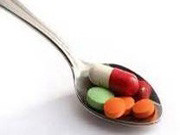China tightening regulation of pharmaceutical sector

 0 Comment(s)
0 Comment(s) Print
Print E-mail CNTV, July 23, 2013
E-mail CNTV, July 23, 2013
Spokesman for the Belgian drug maker UCB has admitted that the company’s Shanghai office is being investigated by China’s State Administration of Industry and Commerce, the country’s market watchdog. It’s the second such investigation into an overseas drug maker in China. UCB’s Spokesperson has said other pharmaceutical companies operating in China are also under investigation.
It’s not known whether the Belgian drug maker UCB is guilty of operational irregularities in China. But officials from the economic crime office of China’s Ministry of Public Security say other overseas drug makers are also being investigation for financial misconduct.
Industry insiders believe this is a sign China is starting to tighten its grip on foreign pharmaceutical operations in China.
Some believe China may see a nationwide price cut on medicines.
China’s medical system has long been burdened by high medicine prices. Imported medicines are a major target of critics. In the GSK case, it’s Chinese executive, Liang Hong, who’s been detained by police, has confessed that consumers are paying for the cost of corruption.
"The money spent on bribes makes up nearly 20 to 30 percent of the total price of the medicines," said Liang Hong, Vice-President of Operations Glaxosmithkline China.
Since July, China’s economic planner, the National Development and Reform Committee, has launched an investigation into drugs pricing. Over 60 pharmaceutical companies are involved.
Yet, it’s not just the foreign companies that have to watch their conduct. Early in July, China’s Food and Drug Administration launched a crackdown on the production and sale of illegal medicines, including both western and traditional Chinese medicine.
“We’ve noticed that some companies are making drugs with unlicensed materials. Others are lending their operating qualifications to other companies. Some clinics are even selling counterfeit drugs. These are the targets of this operation,” said Yan Jiangying, Spokesperson of State Food and Drug Administration.
Many have blamed fraud and corruption in the pharmaceutical industry on China’s medical system, where the prescription of drugs is used as a top up for doctors’ low incomes. According to a report on a pilot reform of public hospitals in China, separating prescription and diagnosis is still a difficult task. Though the Chinese government has shown clear resolve to fight corruption, it’s still unclear whether the current investigations will eradicate illegal practices from China’s drugs market.






Go to Forum >>0 Comment(s)